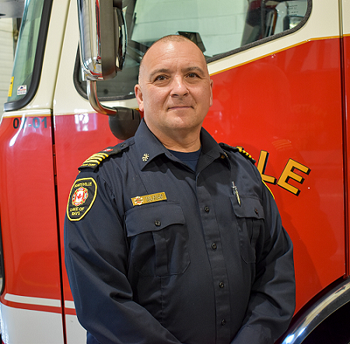Leadership Speakers and Presentation Overview
Leadership Speakers and Presentation Overview
Leadership’s Impact on Retention and Recruitment
Keynote Speaker: Rick Gurba
 The Volunteer Retention Research Report published by the NVFC in 2020 identified the top three reasons why volunteer firefighters stop volunteering. The individuals in their research reported (1) leadership; (2) cliques; and (3) training requirements were at the top of the list of reasons for leaving a fire department. The importance of understanding why people leave is one of several key indicators of how the department is performing. Just as important is understanding the skills of those individuals leaving the organization. Attrition may cause a volunteer department to state “we need to recruit more people.” However, depending on the job(s) performed by the departing individual, a new volunteer may not be an equal, adequate, and suitable 1-for-1 replacement. Throughout this presentation, several case studies will highlight both good and bad examples which affected their department’s retention of personnel.
The Volunteer Retention Research Report published by the NVFC in 2020 identified the top three reasons why volunteer firefighters stop volunteering. The individuals in their research reported (1) leadership; (2) cliques; and (3) training requirements were at the top of the list of reasons for leaving a fire department. The importance of understanding why people leave is one of several key indicators of how the department is performing. Just as important is understanding the skills of those individuals leaving the organization. Attrition may cause a volunteer department to state “we need to recruit more people.” However, depending on the job(s) performed by the departing individual, a new volunteer may not be an equal, adequate, and suitable 1-for-1 replacement. Throughout this presentation, several case studies will highlight both good and bad examples which affected their department’s retention of personnel.
This session will focus on two of the reasons mentioned above; (1) leadership, and (2) cliques. More than a dozen leadership characteristics required of chief officers, administrative officers and board members will be discussed in detail. Recommendations to helps alleviate cliques will also be presented. By the end of the session, the participant should gain a better understanding of the knowledge, skills and abilities required of today’s leaders and take away several actionable items to help improve their department.
Rick Gurba is the Director, Education and Training at VFIS. He leads an eclectic team of education specialists and consultants from across the United States. Each individual is responsible for client education and training presentations to the fire, EMS and 911 center disciplines on a variety of risk management topics. Subject areas include emergency vehicle driver training, patient handling, managing ESOs, retention, recruitment, emergency service personnel safety, and risk control for mid-level managers, and many other customized courses for our clients.
Additionally, Rick provides subject matter expertise for VFIS in volunteer fire and EMS leadership, financial management, mergers & consolidations, personnel management and development, NEMT, and mobile integrated healthcare. He was also involved in the development of ResponderHelp.com – an online resource with more than 5,000 items including sample SOGs, technical bulletins, research, videos, podcasts, and training.
Rick earned his Paramedic certification at Harrisburg Area Community College (HACC) and his B.S. in Emergency Health Services Management from UMBC. He served as Pennsylvania affiliate faculty for ITLS, associate faculty for the HACC’s EMS programs, and served as a VFIS instructor trainer since 1998.
An Introduction to Effective Command
A workshop introducing new, developing or established Incident Commanders to training tools with support officer development and skill maintenance. Suitable for Lieutenants, Captains, Battalion Chiefs, Platoon Chiefs, and District Chiefs.
Speaker: Dr. Katherine Lamb
Dr Katherine Lamb is a respected authority on the training and assessment of Incident Command and crisis decision making. Katherine worked as an accomplished research academic before joining the Fire Service in 2004. During her career, Katherine served in several UK Fire Departments with her final post as Lead Officer for incident command training and assessment.
In 2015, Katherine developed Effective Command, a behavioural marking system for the assessment and recording of incident command competence. This development tool is accredited and endorsed by several professional bodies and academic institutions and used Internationally as the Best Practice methodology to train and assess incident command competence.
Fire Service Health and Safety & Tactical Truths
This session will provide Fire Service Leaders with information on all facets of fire service health & safety; including providing guidance on managing the most significant hazards firefighters face and how to implement improved safety on the fire ground. The second part of the session will explore a series of Tactical Truths and look at how science has changed the fire service and how fire ground tactics have needed to modernize. The session will utilize fire ground photos & videos to put participants into various scenarios and discuss tactical outcomes.
Speaker: Deputy Chief Rob Grimwood, Mississauga Fire and Emergency Services

Rob is a Deputy Chief with the City of Mississauga Fire and Emergency Services where he oversees the Professional Development & Accreditation and Communications Divisions, along with serving as the Management Co-Chair for the Joint Health & Safety Committee.
Formerly Rob was the Deputy Chief of Training, Safety, & Special Operations for the City of Vaughan Fire & Rescue Service and the Fire Chief in the City of Dryden, Town of Niagara-on-the-Lake, and Haldimand County. He has also served as a Firefighter with the City of Toronto.
He worked as a Paramedic for 20 years and spent nine years as the Paramedic Chief in Haldimand County.
He has been a member of the fire service for the past 27 years, the last 15 of which have been in various senior leadership positions. He is the President of the Ontario Association of Fire Chiefs (OAFC), Management Co-chair of the Ontario Fire Services Section 21 Committee and an instructor for Dalhousie University’s Fire Service Management Program.
Lithium Ion
A constant for the fire service is the ever-challenging environment we are asked to operate in. Certain challenges have been around for a while and somewhat become routine. Then something comes along that truly changes the way we have to conduct our business. Right now, that challenge is being led by the global explosion regarding the use of Lithium Batteries. You can find them in every facet of our daily lives. Along with their growing popularity comes the increase of fire emergencies due to the failure of this type of battery. Learning how to deal with the new phenomenon of “thermal runaway” is what this presentation focuses on. The goal is to share information you may already know but just need to have the conversation to better understand what you and your department can do to help protect your people and inform the general public with proper safety messaging when dealing with Lithium Batteries.
Speaker: Deputy Chief Paul Calleja
 Born in Toronto but a resident of Huntsville for over 40 years. Joined the fire department as a volunteer in 2005 and since then I have held various positions. I was able to make the fire service my full-time career in 2013 when I moved into the role as Training/Suppression Captain for the department. Currently I hold the position as Deputy Chief of training and operations and have been doing this since April 2022. Our department consists of 5 stations and approx. 100 members. We are kept busy in the heart of Muskoka and this year are projected to run upwards of 900 calls.
Born in Toronto but a resident of Huntsville for over 40 years. Joined the fire department as a volunteer in 2005 and since then I have held various positions. I was able to make the fire service my full-time career in 2013 when I moved into the role as Training/Suppression Captain for the department. Currently I hold the position as Deputy Chief of training and operations and have been doing this since April 2022. Our department consists of 5 stations and approx. 100 members. We are kept busy in the heart of Muskoka and this year are projected to run upwards of 900 calls.
Outside of my role as DC I also have the privilege of sitting on two provincial committees. I currently am on the executive as Secretary for the Ontario Association of Fire Training Officers (OAFTO), a role which I have enjoyed for the past 5 years. In addition, since 2015 I have been a member of the Training and Education Advisory Committee through the OAFC.
A definite highlight of my career happened a year ago when I was able to attend a two-day symposium hosted by FDNY at their training facility “The Rock”, in New York. The focus was on Lithium Battery emergencies and the issues being caused for the fire service. This was an important steppingstone in leading me to where we are today and provided the foundation for the knowledge and information I hope to share with you. I look forward to speaking with each of you in person on a topic that has many questions, but those questions do have answers. Lithium batteries are and will be a large part of our everyday lives and it is our responsibility to do everything we can to learn how to deal with them effectively to keep our members and the members of the public safe!
FireCon 2023 Panel Descriptions
Mutual Aid/Interagency Response Panel
Sometimes we just can’t do it by ourselves! Fire departments across Ontario have a built-in system that allows us to help each other and utilize the resources needed to safely and effectively bring an emergency situation under control.
This panel of experienced fire service members discusses some of the recent large-scale mutual aid/interagency responses that have taken place across the province. They will highlight some of the positive outcomes as well as lessons learned from their experiences.
Emergency Management/Evacuation Panel
Many Chief Fire Officers across Ontario are also the CEMC of their municipality or involved with Emergency Management in their community. As large-scale emergencies become more common across Canada the role of the Chief Officer and fire department is adapting to support emergency management.
This panel of experienced fire service members discusses some of their recent emergency management responses including forest fires, flooding, as well as acting as an evacuation hub and host. They will highlight some of the positive outcomes as well as lessons learned from their experiences.
Health & Safety Panel
What is the role of Health & Safety in the fire service? The fire services is constantly changing and evolving and the type and frequency of calls fire departments across Ontario respond to on a daily basis is requiring more time and training then ever before. Ensuring your fire department has a strong Health & Safety Program is key to protecting your firefighters so they can protect your community.
This panel of experienced fire service members discusses the Health & Safety requirements of today’s fire service and how they are implementing different programs in their fire departments. They will highlight some of the positive outcomes as well as lessons learned from their experiences.
